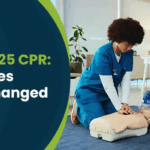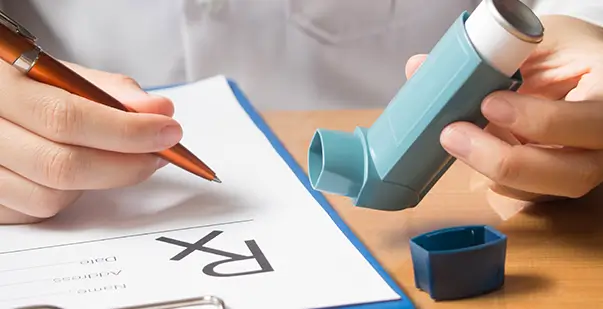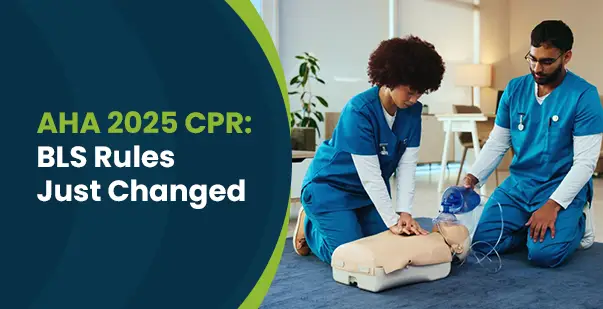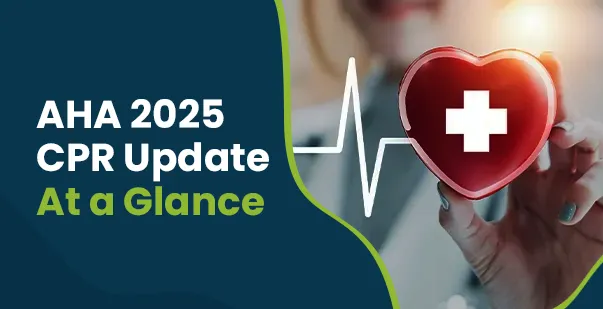Imagine you are at an event, and suddenly, two people start coughing and having trouble breathing. People around might assume they both have the same thing: asthma or bronchitis. But did you know these two conditions are different?
In this blog post, we will learn about these two common breathing problems – asthma and bronchitis. We will also explore the dissimilarities between them. We will cover essential first-aid techniques to help someone experiencing respiratory distress. Want to learn about CPR and first aid for respiratory issues? Consider taking a course offered by American HealthCare Academy (AHCA). Let’s proceed further and gain a better understanding!
What Causes Respiratory Distress?
Respiratory distress happens when someone has trouble breathing. Various factors can cause respiratory distress. Allergies such as pollen or pet dander can trigger breathing difficulties. Infections like colds or the flu can affect the respiratory system too. Breathing in smoke from fires or tobacco can be harmful. Even exercise can lead to respiratory distress, especially for individuals with underlying conditions.
Breathing is essential for our survival. When our body doesn’t receive enough oxygen, it can be scary. It feels as though we are desperately gasping for breath. We may start wheezing, coughing, or struggling to take a breath. In situations like these, it is crucial to know how to help someone experiencing respiratory distress. By understanding the causes and preparing ourselves to offer help, we can make a life-saving difference.
How Are Asthma and Bronchitis Different?
Asthma and bronchitis are two different conditions, but they both affect our breathing. Understanding the differences between asthma and bronchitis is crucial. It enables us to recognize the specific symptoms and respond. By being aware of these distinctions, we can provide appropriate care to them. It will enable us to support individuals experiencing respiratory distress related to asthma or bronchitis. So let’s understand them better:
- Asthma
Asthma is a long-term condition that can make it hard to breathe. It happens when the airways in our lungs become narrow and inflamed. People with asthma may experience wheezing (a whistling sound when breathing), coughing, and shortness of breath. Various factors can trigger asthma symptoms, including exercise, allergies, or cold air.
- Bronchitis
Bronchitis refers to the infection or inflammation of the bronchial tubes. These tubes are responsible for carrying air to the lungs. Bronchitis can be either acute, lasting for a short duration, or chronic, persisting for a more extended period. The main symptoms of bronchitis include persistent coughing with the production of mucus, chest discomfort, and difficulty breathing. This condition is a result of viruses or bacteria.
First Aid and CPR Certification for Respiratory Issues
If you encounter someone having trouble breathing due to asthma, bronchitis, or any other respiratory issue, here are some important steps you can take to ensure effective first aid for respiratory issues:
- Stay Calm and Reassure
The person experiencing difficulty breathing may feel scared or anxious. Stay calm and provide reassurance. Make them aware that you are available for any assistance they may need.
- Help Them Sit Upright
Assist the person in sitting upright, as this can help improve their breathing.
- Encourage Slow Breathing
Encourage the person to take slow and deep breaths. This can help them relax and open up their airways.
- Use Inhalers (for Asthma)
If the person has an asthma inhaler, help them use it according to their prescribed instructions. Inhalers deliver medication to the lungs, helping to relieve asthma symptoms.
- Seek Medical Help
If the breathing difficulties persist or worsen, call for emergency medical help. It is always better to be safe and let healthcare professionals assess the situation.
First Aid and CPR Certification from American HealthCare Academy
Obtaining First Aid and CPR certification from the American HealthCare Academy can be beneficial. Our courses cover basic to advanced understanding of respiratory issues and other medical emergencies. By enrolling in our certification courses, you can gain valuable knowledge and skills to provide immediate help to those in need.
AHCA’s training programs cover essential first aid techniques, including assessing breathing problems, performing CPR, and administering appropriate care. With AHCA certification, you can enhance your confidence and readiness in responding to respiratory distress and save lives. Consider enrolling in their courses to become a certified responder in respiratory emergencies.
Conclusion
Respiratory distress can be a frightening experience, but understanding the differences between asthma and bronchitis can help us respond better in these situations. Remember, if someone is having trouble breathing, stay calm, help them sit upright, encourage slow breathing, and seek medical help if needed. By learning more about first aid and CPR, you can be better prepared to assist others in respiratory distress. Don’t forget to check out the first aid courses offered by AHCA to enhance your knowledge and skills. Stay safe and take care!









